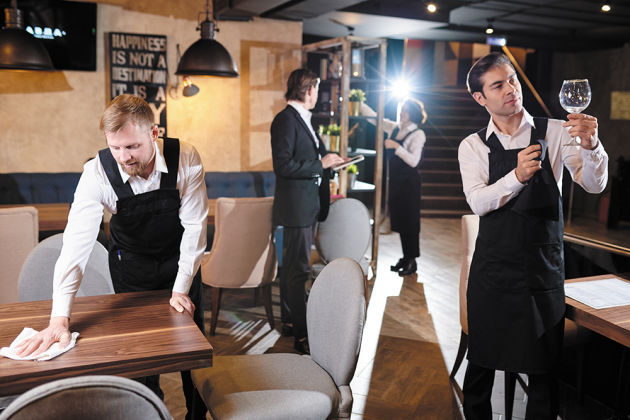
Friday Read: Hospitality is in for a rough ride
Wine duty hikes, currency devaluation, Brexit uncertainty – the Conservative government has been no friend of the wine trade. When the previous budget was unveiled in 2019, wine was the only drinks category to be hit with a duty rise. It was another ill-timed kick in the teeth for the trade, at a time when businesses were already coping with escalating overheads and staff shortages.
However, the announcement made by Home Secretary Priti Patel this week dwarfs all seismic shocks experienced over the past four years. On February 19th, the Conservatives unveiled a new points-based immigration system, designed to attract “the brightest and the best” talent to the UK.
After the transition period ends in December 2020, new government measures will levy restrictions on entry to the UK, with applicants required to attain 70 points; these can be earned in various ways, but English language competency and a firm job offer are among the base requirements needed to earn 50 points. Applicants will have a head start over competitors if their starting salary is over £23,040, or if they are moving into a sector with known skills shortages.
The hope is that the new rules will end the influx of unskilled labour migration to the UK, forcing businesses to recruit from local communities, and invest in technology and automation. Patel claimed that the government's radical new immigration plans could be filled by 8.5 million “economically inactive” people in the UK.
Journalists have already debunked this claim, referring to data from the Office for National Statistics. It shows that the 8.5 million 16- to 64-year-olds currently not seeking work include around 2.3 million students and 2.1 million long-term sick. Add into the mix over 1 million retired Britons and fewer than 1.9 million people are realistically eligible for work.
The likelihood of the new measures having a wide reaching, costly and even devastating impact on hospitality businesses cannot be underestimated. Restaurants, hotels, pubs and bars across the UK, self-evidently, rely on non-British citizens to keep their operations running. I cannot remember the last time a British waiter served me in London. This is not due to an intractable bias; British people, by and large, dismiss hospitality work as beneath them. The hours are long, the pay is minimum wage. And even with freedom of movement still in place, the number of vacancies across the sector are unprecedented.
Philip Richardson, Partner & Head of Employment Law at Stephensons Solicitors LLP, said that the plans would “drastically affect employers who rely upon this type of migrant worker,” potentially leading to decreased productivity, income and a lack of specialist skills.
“Although the government wants businesses to recruit locally and change their recruitment model this could be impossible as many employers struggle to secure British employees,” explained Richardson.
“Future employers are advised to update contracts for newly arrived migrant workers from January 2021 but not those currently in employment. They could also face penalties if they employ a migrant worker, who enters the UK without a previous job offer and is unable to speak English.”
According to the IPPR think tank, the new immigration plans will rule out around 70% of EU workers currently in the country. If the on-trade cannot find replacement labour, then an already fragile sector could be heading for the biggest recession in living memory.
Yet some businesses remain sanguine. The owner of a restaurant in Cardiff – who preferred to remain anonymous – described the problem as “London-centric.” She underlined the point that many smaller cities and towns do rely on British nationals to work in their restaurants and pubs.
“I never source non-English speaking foreigners so this is not an issue,” says Ted Sandbach, owner of the Oxford Wine Company and Cafes.
“However, I do employ some European staff and they are good. But I don't see it as a major issue for us here in Oxford where we have an abundance of students on part time work. Some senior staff will earn enough not to be affected by the new points-based system.”
Indeed, London will feel the pain most acutely. Astronomical costs of living will discourage British nationals from applying for jobs, unless they're happy to commute to the outer suburbs of the M25. Restaurants and hotels rely on delivery companies, whose drivers – at least in my experience – are rarely British-born. If there is a foreign worker flight, who will take their place?
Nevertheless, it is inarguable that other large metropolitan areas will be severely affected by Patel's new project. The challenge now facing these businesses is formidable – can the hospitality trade make itself more attractive to UK workers? That will require a considerable investment and probably higher average wages – changes that many owners will be unable, or unwilling, to sanction.
Of course, Brexit is primarily a political project, not an economic one. You can only understand the decision through this prism. A tough stance on immigration was necessary to keep the Conservatives' new voter base happy and ensure future election success.
Patel's bombshell has forced the hospitality trade – particularly in London - to grapple with its inability to attract local talent. It is likely that some businesses will simply fail, particularly as there are more headaches to come.
In addition to rising employment costs, further excise duty rises on alcohol are probable. Even with a sound trade deal, the Treasury will be desperate to claw back any revenue it can. Alcohol will be a soft target and I'm convinced that future budgets will contain significant duty rises on alcohol. Once again, the Tories have proven that they feel no solidarity with the UK's hospitality sector. There are bad times to come.





